Topics: Diversity, Diversity in Science, Nobel Laureate, Nobel Prize, Women In Science
The Ig Nobel is an actual "thing." From their own description:
The Ig Nobel Prizes honor achievements that make people LAUGH, and then THINK. The prizes are intended to celebrate the unusual, honor the imaginative — and spur people's interest in science, medicine, and technology.
Every September, in a gala ceremony in Harvard's Sanders Theatre, 1100 splendidly eccentric spectators watch the new winners step forward to accept their Prizes. These are physically handed out by genuinely bemused genuine Nobel Laureates.
CEREMONY: The 26th First Annual Ig Nobel Prize ceremony will happen on Thursday, September 22, 2016, at Sanders Theatre, Harvard University, Cambridge, Massachusetts, USA. Tickets will go on sale in July.
It's mostly tongue-in-cheek obviously, but this article from Forbes caught my eye and reminded me of one I did in 2011 titled "Dark Matters" along the same vein.
The people I root for in the actual Nobel seem to never make it. Yet, in my and other's opinions, they're doing really great research and science that should be applauded, appreciated and lauded. Carl Sagan was so vilified when he was attempting to PROMOTE science via the original Cosmos - by other scientists - The Sagan Effect gives most caution and pause as to how much they'll enter the public sphere, if at all.
I've grown cynical, and not so sure that the Nobel Prize in its current format is the way to do so (I've given similar critique to the motion picture academy). It seems to me, the current format is contributing mostly to the old-boy system and "the big head."
The Nobel Prizes are not the final say in good science, and Nobel laureates are not necessarily the best scientists — much less the wisest human beings.
And like it or not, people listen to Nobel laureates when they speak, even when they are out of their areas of expertise. Sometimes the prize seems to go to the winners’ heads so much that they seem to lose it entirely. William Shockley, a co-discoverer of the transistor, and James Watson, who won the Nobel for discovering the structure of DNA, both used their reputations to promote very racist ideas. Most recently, Tim Hunt said some sexist and insulting things in front of a group of female Korean scientists — who had invited him to speak, no less.
One pointed excerpt by the author:
- Then there’s the bias toward European and American researchers, which is thankfully becoming less pronounced. However, historically it’s been a huge problem, and that’s not even including the antisemitism in the prize committee’s early years. No Nobel was given in 1921 to avoid awarding Albert Einstein. (He was grudgingly given the 1921 award the following year along with Niels Bohr’s 1922 prize, and even then antisemites fought his inclusion.) Racism in science is a very uncomfortable topic, but we need to face up to it, and the Nobel Prize hangs a lampshade on the extent we have yet to grapple with it.
Last year, we lauded Einstein for his contribution to the General Theory of Relativity; his coinciding birthday also as the nerdy "Pi day": 3/14/15, 9:25:53 am (3.141592553). This could all have been hidden and buried under a mound of antisemitism ignorance, not unlike the efforts in Texas to classify slaves as volunteer "workers," clearly in contradiction of their own publicly stated Articles of Secession, where variants of "slave" is mentioned over 20 times, as well as demonstrably faux denouncements of Africans.
I'm also inspired by Einstein's early stance on Civil Rights and friendship and activism with Paul Robeson. I think we unconsciously hold our Laureates to this standard, and are disappointed when they fall from Olympus; their Achilles heels quite evident.
We will fall as a nation and species under the weight of our own hubris.
Forbes: The Nobel Prize Is Bad And We Should Feel Bad, Matthew Francis

Comments